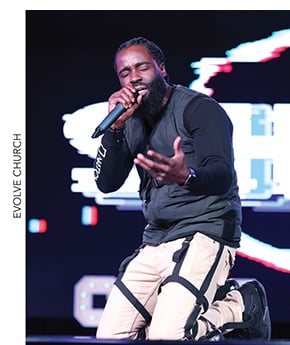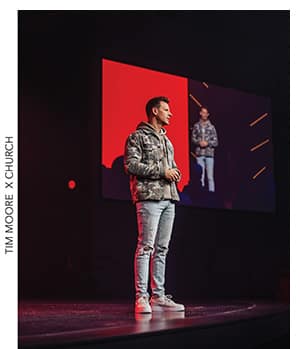By Randy Wheeler
“What kind of impact could we have on the city of Milwaukee if we had 1,000 millennials who were on fire for Jesus?” Pastor Ken Lock posed this question to a small group of friends as they dreamed about the kind of church they wanted to plant.

In 2018, Evolve Church was born. One year later, Evolve had 1,000 millennials attending who were on fire for Jesus! Then COVID hit, and for the next 19 months the church was locked out of the high school they rented, services went online, and Evolve began to search for a more permanent home.
It turns out, they found more than a physical home. They found a spiritual home with a new family in a movement they had never heard of—the Restoration Movement.
Evolve Church is one of a growing number of independent, Bible-believing churches that were doing ministry on their own—some very effectively—but discovered the joy and benefit of being part of a larger group of like-minded churches. Their pastors are experiencing the joy of new friendships with RM pastors who have mentored them, encouraged them, and prayed with and for them. They are reaping the benefits of shared ideas and iron sharpening iron in this environment, this tribe, where the Word of God is the primary source of guidance. They are thriving in the soil of the Restoration Movement.
X Church in Columbus, Ohio, is another great example. Since being planted over 20 years ago, the church had always said they were “nondenominational and unaffiliated.” Founding pastor Tim Moore explains, “It was not because we didn’t want to be, but if we ever did it, we wanted to find people who share our same heart and vision for church and reaching people, and if that ever happens, we are open to it.” It wasn’t until 2016 that his church found such people—in the Restoration Movement.
An Appealing Vision
What struck both these pastors, and many others like them, is the simple appeal of the Restoration Plea—a return to New Testament Christianity and a desire to break down the walls that divide churches and be united in the cause of Christ.
Tim Moore sees a shared “heart to restore people to God.” He says,
We’ve always been about trying to remove religion, remove religiosity, to remove legalism and restore people to God. Restoring them to the Bible. I think it’s a fresh sense of a New Testament type of church in so many ways. I think at the heart of it though, what I’m drawn to, is that every Restoration Movement pastor I meet, regardless of the kind of flavor or style, seems to have a shared passion for reaching the lost.
When Ken Lock and his team were sitting in his living room in 2018 dreaming of the kind of church they would plant, they knew what they didn’t want. He says,
When we first started, mind you, we were a bunch of church kids essentially. We were millennials, but we were all born and raised in church. And we really had just become tired, fatigued, and . . . depleted with denominational lines [such as], “We’re over here and we believe this and we do this” and “If a person isn’t a part of your denomination, you don’t fellowship with them.” . . . But we were just at a place of, “Man, let’s just go back to the Bible. Let’s go back to the book of Acts. . . . Let’s remove as much fluff as we can and get back to the grounding principles of following Christ.”
Lock let loose a hearty laugh before continuing,
We were young and we were thinking Man, we’re probably the first ones who ever did this. Nobody’s doing what we’re doing. It sounds funny, but we thought we created it! When we heard about the Restoration Movement, we were like, “News flash. There are thousands and thousands of pastors who’ve been doing it for years. An entire movement. And we’re the only ones who hadn’t heard about it!”
A Place to Belong
The Restoration Movement’s vision of unity around a return to New Testament Christianity is what drew in both Lock and Moore. In it, they found a place to belong—a supportive network of like-minded pastors who accepted them as brothers and poured into them and their ministries.

“I’m really grateful to The Solomon Foundation, not just for the funding, but for bringing us into a tribe and a network,” Moore says. At a pivotal point in his ministry, at his first RM event, Moore met Tim Liston, pastor of New Hope Church in Manvel, Texas, who was speaking there. Liston was born and raised in the Restoration Movement, the son of a pastor, and is an Ozark Christian College graduate. Liston put his arm around Moore and welcomed him into the family.
“I just resonated with what he was talking about,” Moore says. “I talked to him and he said, ‘Give me your phone.’ And he typed his phone number into it and said, ‘Give me a call.’ And ever since then he’s been like a mentor to me.”
Moore listed Restoration Movement pastors like Matt Merold, Clayton Hentzel, Matt Wilson, Barry Cameron, Shannon Lovelady, and many others who have poured into his life and ministry.
“I feel like I have five to ten different people at any given time I could ring up if I wanted to ask questions and they would take my call,” he says. “I didn’t have that before. Just having someone like Don Wilson message me to say, ‘Hey, I believe in you,’ having people do that who’ve been successful in ministry, that means a lot.”
Ken Lock counts Don Wilson, Chris Philbeck, Jerry Harris, and good friend Mark Weigt as major influences from within the Restoration Movement who have mentored him in areas such as church leadership, effective biblical preaching, multisite campuses, and “staying grounded in the core principles and what it is that we believe.”
But Lock says it goes beyond ministry; he feels the support personally.
“I look at my dad and other pastors that I’ve seen struggle, just trying to find community, trying to find belonging, trying to find some trusted spaces. God provided me with such a community. There’s always going be somebody saying, ‘How are you doing? How can I pray?’”
Unity with Diversity
In the church extension fund world, churches like Evolve and X church are sometimes called “fringe churches.” They don’t go back generations in the movement. Their pastors didn’t graduate from “our” colleges. They may not check every box on the RM doctrinal checklist, and we may not agree on every church practice or preference . . . but neither did the founders of the movement, and neither do many “generational” RM churches today. But wasn’t one of our movement’s earliest core values, “In essentials, unity; in opinions, liberty; and in all things, love”?
Since moving into their new facility in early September, Evolve Church has grown by more than 1,200 people worshipping weekly. On one Sunday in December, they saw 78 people baptized into Christ; then, the first Sunday in January, 100 more were baptized. Their worship service might be a little more “exuberant” than most RM churches. They may have a different spin on some things in the “opinions” category. But what is more “essential” than passionately living out the Great Commission with which Jesus left us? There we find powerful unity.
There’s More!
“There are more pastors who need to know about this,” says Ken Lock. “More churches who need this community. If I could be totally honest, I feel bad for those who don’t have access to what I have.”
“This is an incredible secret that other pastors need,” Tim Moore says. “There are pastors who are like I was, floating along trying to figure out how to reach people with the gospel today, but with no real connection or affiliation.”
Friends, we need to spread the word and extend more invitations. Take a nondenominational pastor to lunch this week. Share the vision of the Restoration Movement. Invite him to Spire or Renew or one of the many other conferences led by RM pastors. Invite him into your circle of RM pastor friends.
A recent Christianity Today article noted, “The number of nondenominational churches has surged by about 9,000 congregations over the course of a decade.” What impact would be possible if we simply got back to our Restoration Plea and invited those congregations to join us in unity based on New Testament Christianity, to bring lost souls to Jesus?
Randy Wheeler serves as vice president and relationship manager with The Solomon Foundation.

I, too, believe The Solomon Foundation, enjoys a unique position and ministry within the Restoration Movement. In increasing the kingdom of God rather than simply providing funds to erect buildings , they are doing more to promote unity than I’ve seen happen in my lifetime (somewhat long lifetime).